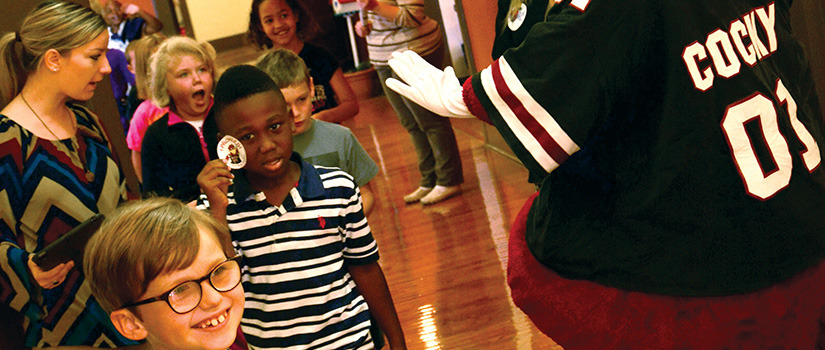Posted December 14, 2015
Story by Adam Collins, Reprinted from InterCom
Photo: The kids at Little Mountain Elementary School proudly show off their stickers
promising Cocky to read every day.
Ten years after its first school visit, CRE™ (Cocky's Reading Express™ ) is still working toward eradicating illiteracy in South Carolina and getting kids excited about reading.
"The moment Cocky entered the room, the excitement level just amplified," media specialist Julie Haltiwanger says. "I noticed that the students in the back of the room started to get antsy during the book readings, but once Cocky came in, all eyes were on him."
CRE is exciting, and it's making a tremendous impact. After a year of read-alouds with Cocky, students' reading attitudes have improved by as much as 20%.
School faculty members are perhaps just as excited about CRE as the students. During the program's recent visit to Little Mountain Elementary, about 25 miles west of Columbia, school counselor Sherry Swindler described Cocky as a role model for bright young minds.
"The kids idolize Cocky," says Swindler. "He is a figure who they have seen and admired on television... He inspires them."
But beyond inspiration, CRE set out to document the impact of its efforts boosting reading readiness. In its early years, the program achieved tremendous breadth, reaching every county in South Carolina. It needed depth.
During the 2013-2014 academic year, CRE teamed up with USC's Arnold School of Public Health to conduct an intensive instructional summer program to help students develop necessary literacy and reading skills. With the help of 170 USC volunteers, CRE made 13 school visits, conducted 78 read-alouds, and distributed 3,767 books. Visiting two Calhoun County elementary schools six times each, CRE administered a reading attitude survey to 520 students ranging from pre- kindergarten to second grade. A series of questions was posed to each of the students at the beginning of the program, and again during the last visit.
After seeing Cocky, the same kids who said they didn't think reading was fun were already asking when they would get their new books.
Mandy Waites, kindergarten teacher
The largest difference between pre- to post-program was found when students were asked, "Do you like to read?" Pre-kindergartners at Sandy Run Elementary showed the largest difference, with a whopping 20% increase, and kindergarten students at St. Matthew's Elementary showed a 12% increase.
Prior to the survey, first graders at both schools were given iPads to read eBooks, which likely resulted in greater enthusiasm for the new technology. Students were also asked if they had a special place to keep their books.The kindergarten classes at Sandy Run Elementary saw a 16% increase in students who said they did keep their books in a special place. When asked if they read every day, first graders at Sandy Run Elementary showed a 16% increase in students who stated they did, and the first graders at St. Matthew's Elementary showed an 11% increase.
CRE director Kim Jeffcoat stresses that these reading levels need to be up to par before students reach the third grade. In 2010, University of Chicago researchers analyzed third grade students' reading levels between 1996 and 1997, and found that after the third grade, students' academic successes become exponentially more difficult if their reading levels are not up to standard. As of 2013, the SC Education Department reported that only 83% of third grade students were reading on grade level. According to Jeffcoat, these reading levels are "important markers for students' future academic successes."
South Carolina has a way to go. The Literacy Center, a nation-wide educational program for adults, found that in 2014, South Carolina had the thirteenth highest rate of illiteracy in the United States. Is the program changing that?
Since combining a mascot with a dynamic reading program like CRE has proven to be such a successful model, the program is hoping to soon expand its literacy outreach approach to other universities.
The data is clear: CRE is getting students excited about reading. With the program's helping hands, the futures of South Carolina students look more promising than ever before.
Adam Collins is a senior Visual Communications major.
